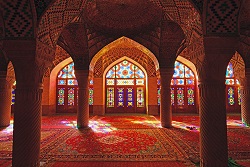Boarding Complete: An Islamic Rendering
Part I of II
.jpg) Islamic Principles not only lay guidance on the relationship between man and God but also provide directives on a system of transactions for dealings between man and man to lead a life in an Islamic way. Such Islamic jurisprudence referred to as "Shariah, " and commercial or banking transaction forms a small but very crucial part of Shariah. Many financial institutions in Muslim states have Shariah boards, religious advisors or such experts to advise on the compliance of transactions with Shariah. It is pertinent to note that Shariah law is not codified law but based on interpretations of holy Quran, and therefore it can be applied differently in different states to extend the interpretations as they differ based on the four major schools. However, in general, major principles such as the prohibition of riba (meaning an excess which is the ban of interest in commercial business transactions), maisir (speculation or gambling), gharar (unjust enrichment or unfair advancement based on uncertainty or upon the occurrence of events) are commonly applicable to major schools.
Islamic Principles not only lay guidance on the relationship between man and God but also provide directives on a system of transactions for dealings between man and man to lead a life in an Islamic way. Such Islamic jurisprudence referred to as "Shariah, " and commercial or banking transaction forms a small but very crucial part of Shariah. Many financial institutions in Muslim states have Shariah boards, religious advisors or such experts to advise on the compliance of transactions with Shariah. It is pertinent to note that Shariah law is not codified law but based on interpretations of holy Quran, and therefore it can be applied differently in different states to extend the interpretations as they differ based on the four major schools. However, in general, major principles such as the prohibition of riba (meaning an excess which is the ban of interest in commercial business transactions), maisir (speculation or gambling), gharar (unjust enrichment or unfair advancement based on uncertainty or upon the occurrence of events) are commonly applicable to major schools.
Conventional financing methods and instruments are mostly based on interest structure whereas Islamic finance techniques must comply with Shariah bans levying of interest. The latter does not mean that Shariah prohibits making profits. Rather, the system scrutinizes the basis of making said profits as charging interest is harmful to borrowers. Wherein, although there is a lack of effort by the financier they will still enjoy profits. Such deliberations lead Islamic scholars to establish Islamic financial instruments and techniques to prevent the commission of sin for prohibited acts as per the Quran and Sunna.
Ijara is one such Islamic financial leasing principle gaining momentum in the UK, France, Canada and other parts of the world. The use of Islamic financial leasing has changed from an interpretation of leasing for household or daily use necessities to large construction and leasing transactions of substantial assets such as aircraft's and vessels. Before venturing further into the use of Islamic financial leasing transaction for aircraft financing, we would like to elucidate to our readers about the concepts of ijara (Islamic financial leasing) and related Islamic financial instruments that can be utilized while structuring the Islamic leasing transaction.
Ijara
Ijara means providing services or goods on a temporary basis for rental. Including the leasing of equipment, machinery, or other capital assets. There are three types of ijara used in Islamic contracts. They are ijara (operating lease), ijara wa iqtina or ijara muntahia bittamleek (finance lease) and ijara mawsoofa bil thimma (Forward lease).
Simple Ijara
In ijara, a lessee is given right to use the object leased for a specified period, and the lessor retains ownership. The Islamic financial institution/bank will purchase the asset in question and will lease or make available to its customer the use or occupation and possession of assets for a fixed period and price. The premiums will be payable by the bank regardless of their recovery through rentals. This type of leasing is called operating lease. The lessor is responsible for the insurance, registration, and maintenance of the asset leased as it is under the ownership of lessor. Federal Law Number 5 of 1985 (UAE Civil Code) defines the ijara as - "a hire (that shall be conferred) by the lessor on the lessee of the right to use (that is) intended for the thing hired for a (given) period in consideration of an ascertained rent."
Ijara in the above form is similar to a conventional lease. Wherein, the entire cost of assets is not recovered by the lessor, and the payments are made only up to the period of lease for its use irrespective of the total value of an asset.
Ijara wa iqtina
 The other form of leasing under Islamic finance is ijara wa iqtina. This is a finance lease, asset finance, or hire purchase as provided under the ijara wa iqtina principle. Wherein a leasing structure is coupled with a right to buy the asset by the lessee at the end of the lease period at an agreed price. The lease fees are considered to be previously paid and constitute part of the price or consideration for the purpose of sale. The payment made by the lessee is towards the purchase of an asset with any profits as stated by the lessor. A variety of cross-border transactions often use such instruments for a range of asset categories that include aircraft, heavy equipment, vessels, and other assets.
The other form of leasing under Islamic finance is ijara wa iqtina. This is a finance lease, asset finance, or hire purchase as provided under the ijara wa iqtina principle. Wherein a leasing structure is coupled with a right to buy the asset by the lessee at the end of the lease period at an agreed price. The lease fees are considered to be previously paid and constitute part of the price or consideration for the purpose of sale. The payment made by the lessee is towards the purchase of an asset with any profits as stated by the lessor. A variety of cross-border transactions often use such instruments for a range of asset categories that include aircraft, heavy equipment, vessels, and other assets.
Under ijara, the lessor retains the right to re-negotiate the quantum of the lease amount payable at every agreed interval as that would ensure that the rental amount agrees with the market value of the asset. The uncertainty of price to be paid at the end of the lease period for purchase is not acceptable under ijara for reason of uncertainty and applicability of gharar, and hence another contract under ijara wa iqtina is to be made for the sale of the leased asset. In this form of lease, recovery of the full cost and value of the asset by the lessor from the lessee takes place, and the lessee does not have an option to cancel until the lessor receives compensation for such an asset. The option to buy is usually granted at the end of the lease contract period to make up for the lessor allowing them to recover the remainder value of the asset.
Ijara mawsufah fi al dimmah
In UAE, ijara has often been linked to the real property transaction where banks enter into a forward lease agreement to finance its client’s property. Ijara mawsufah fi al dimmah is a combination of a redeemable leasing agreement and construction finance (Istisna’a). In forward leasing, the lease delivers of specified items after their construction. These lease contracts buy out the construction project as a whole upon its completion or in tranches of the project.
The forward lease entails an agreement to lease assets upon the construction, manufacturing, and availability at a future date of such assets. Since forward ijara or ijara mawsufah fi al dimmah is a combination of ijara and Istisna’a, the understanding of the term Istisna’a is essential.
Istisna’a
 Istisna’a means asking someone to manufacture. It is a form of sale and purchase agreement between bank as seller and customer as a purchaser. The seller can produce by itself or get its products manufactured by someone else. The financier usually acting as a seller will get it manufactured and then take over the title of the goods to sell it further to a customer. It is an exception to the general rule that the asset that is the subject matter of the contract is in existence when the parties enter into the contract.
Istisna’a means asking someone to manufacture. It is a form of sale and purchase agreement between bank as seller and customer as a purchaser. The seller can produce by itself or get its products manufactured by someone else. The financier usually acting as a seller will get it manufactured and then take over the title of the goods to sell it further to a customer. It is an exception to the general rule that the asset that is the subject matter of the contract is in existence when the parties enter into the contract.
The financier funds the manufacturer during the construction and acquires title over such asset on completion. Because Istisna’a is a sale and purchase agreement, the purchase price must be a fixed price. The financier sells an asset to the customer for an agreed upon price and through settlement whether in advance, by installments, or by deferred payments to a specific future date or event. Since the tenure of construction completion in large projects is time-consuming taking years to complete, it becomes unattractive for financiers, and hence it is coupled with ijara. The process stated below describes what takes place once the Istisna’a is combined with ijara thereby forming ijara mawsufah fi al dimmah.
How does ijara mawsufah fi al dimmah works?
The asset, which does not exist at the time of signing the forward ijara contract may be acquired by the financier (F) under an Istisna’a contract between the financier and the developer/ contractors/ manufacturer (M). Upon completion and the end of the construction period, delivery of the asset to the customer (C) as per the terms of the lease agreement occurs. At the end of the lease term (i.e. on maturity) and upon meeting all obligations under the forward ijara contract, the bank under a separate sale contract will transfer to the customer the ownership of the property for a token sale price. Upon performance of the agreement of Istisna’a between F and M, a different contract of lease between F and C can be performed, that is the forward lease of goods manufactured. In ancient times such kinds of lease contracts were carried out for unripened food items however it has been transformed to suit and utilization by major construction contracts (muqawala).
The financier's funds the manufacturer for the construction of assets, acquires title over the asset upon completion and passes title to the developer or contractor or customer on agreed deferred payment terms or may lease the asset to the developer or customer under ijara wa Iqtina. In the aircraft financing, the utilization of this method occurs in instances where the aircraft is purchased right from the manufacturer, and the financing takes place only before completion of the aircraft.
Conclusion
Part 2 of this article will continue to analyze Islamic finance leasing under the umbrella of aircraft finance. The topics of discussion will include, sukuk, murabaha, mudarabah, and finally with an application of the discussed principles how Islamic finance leasing works for aircraft finance.
[1] The Quran is the primary source, and it is accompanied and interpreted by the Sunna. In addition to the secondary sources include Ijma, Qiyas, and Ijtihad represent the secondary sources
 English
English
 عربي
عربي Русский
Русский 官话
官话 português
português
 Türk
Türk 






.jpg&w=120&h=80&zc=1)














.jpg&w=120&h=80&zc=1)
















